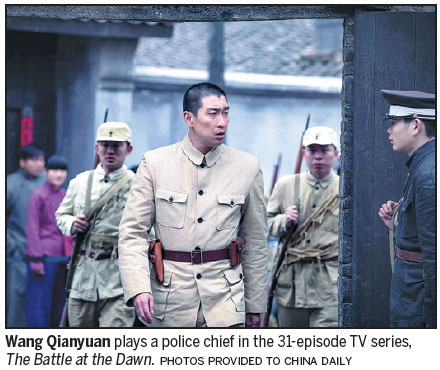From playing a struggling father in The Piano in a Factory to being a ruthless bandit in Saving Mr Wu, Wang Qianyuan is a versatile actor. And, now, with a hit TV series about China's first generation of Communist police, the veteran actor has impressed again.
In the 31-episode production The Battle at the Dawn, Wang plays a police chief, based on Chen Long, the first Communist public security bureau chief in Harbin, in Northeast China's Heilongjiang province.
After World War II, the People's Liberation Army took over the administration of Harbin from the departing Soviet forces in 1946, three years before the founding of New China.
The first public security bureau under the Communists was then established in the city. Chen, a former commander in the Northeast Anti-Japanese Army led by the Communist Party, was appointed as the chief.
Speaking about the production, Chen Zhimin, the vice-minister of China's Ministry of Public Security, which is one of the producers, says the series sheds light on a lesser known aspect of the country's history.
For Wang, the 48-year-old actor behind more than 50 movies and TV series, The Battle at the Dawn is his latest salute to police heroes.
He earlier played an undercover policeman in the 2014 TV series Mekong River Case, based on a real story in which 13 Chinese sailors were killed by a Myanmar drug ring in 2011.
Recalling his visit to Yunnan province to talk to the local police in 2013, he says their efforts in hunting down drug smugglers impressed him.
Two years later, Wang received a call from Liu Jiang, director of The Battle at the Dawn, and he took the lead role.
"It was my first time playing such a high-ranking official," says Wang during a WeChat interview.
Describing his role, Wang says: "I had never played such a character. In most previous revolutionary series, the characters were flawless role models.
"But my character has his struggles and weakness, making him closer to a real person than a cliched hero."
Since the series began airing through two satellite channels in Beijing and Shanghai on March 10, it has soared to the second spot on the charts, according to the TV and broadcasting tracker CSM Media Research.
Meanwhile, despite the accolades he is receiving, Wang, who graduated from China's Central Academy of Drama, did cameos or unpopular leads in the first 15 years of his career.
But his win as best actor at the 23rd Tokyo International Film Festival for The Piano in a Factory in 2010 was a turning point.
The award then brought him lead roles on the big screen, such as in the Andy Lau-starring thriller Saving Mr Wu and 2017 comedy The Village of No Return, costarring with Taiwan star Shu Qi.
Wang, now followed by 1.5 million fans on the Chinese barometer of success Sina Weibo, the Chinese answer to Twitter, is an A-lister. But he says fame is not the most important thing for him.
"I'm not one of those who became an overnight sensation. But thanks to years of struggle and striving, I could polish my acting skills," he says.
As for the future, Wang says that for a country that produces more than 600 movies and approximately 16,500 episodes of TV series every year, China's showbiz industry will evolve to a world-class level soon.
He says that though the China's movie market was lackluster last year, the huge population of moviegoers gives it the potential to develop the industry in a better way.
"I believe we will have productions as good as the top ones in Europe and the United States in a few years," he says.
Speaking about his plans, Wang says that he will make time to learn English.
"I'm a slow learner ... But I think if my English is better, I will have more chances to work in international productions."

